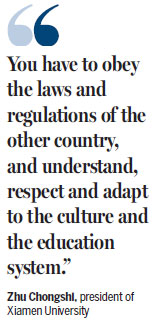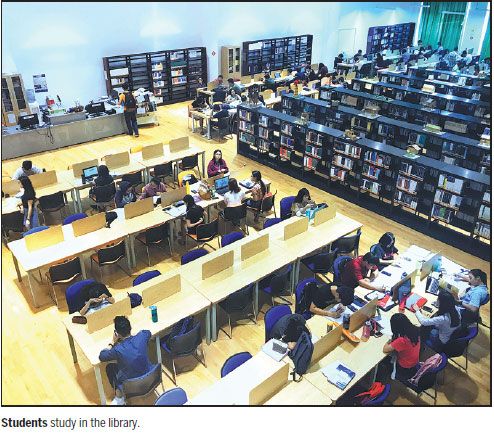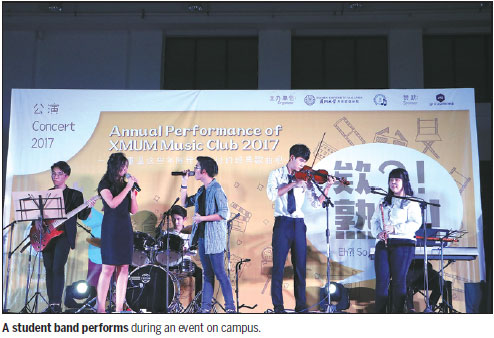

Xiamen University, one of China's most-prestigious schools, is predicting a bright future for its recently opened campus in Malaysia, as Zhao Xinying reports.
As a member of the first group of students to attend Xiamen University Malaysia, Ohg Sui Chang appreciates the feeling of having no predecessors.
"Very few students have such an experience - there are no previous graduates and almost everything on campus is new and waiting to be explored," the 20-year-old Kuala Lumpur resident said, adding that he is excited about the opportunity because he is always willing to try something new and challenging.
In February last year, Xiamen University Malaysia, or XMUM, was officially opened, and 200 students enrolled. It is located 45 kilometers southwest of Kuala Lumpur, the Malaysian capital, and covers an area of 0.6 square kilometers. The total planned floor space is 470,000 square meters and the school is expected to attract investment of 1.3 billion ringgit($300 million).

In recent years, China has deepened international cooperation on education, and by the end of last year, five universities had set up branches or institutes overseas, including Soochow University(Laos), Beijing Language and Culture University (Japan), and Yunnan University of Finance and Economics (Thailand).
What makes XMUM different is that it is the first entirely new campus to be established overseas by a renowned Chinese university.
Historic reciprocation
The idea originated in March 2011, when a senior Malaysian education official met with Hao Ping, a vice-minister of education, and expressed the hope that a Chinese university would establish a campus in Malaysia.
Xiamen University, a leading school in the southeastern province of Fujian, was selected by the Ministry of Education to turn the dream into a reality. The province has a wealth of historical connections with Malaysia; the university was founded in 1921 by the late philanthropist Tan Kah Kee, a Chinese businessman who made a fortune in the rubber trade in what was then Malaya.
After almost a century, Xiamen University, having gained fame domestically and broadened its horizons in an attempt to become a world-renowned institution, expressed its gratitude to Malaysia, according to Zhu Chongshi, the president.

"We consider it historic reciprocation, and believe that the establishment of the campus will definitely boost further cooperation and educational exchanges between China and Malaysia," he said.
According to Zhu, the aim is to build XMUM into one of Malaysia's best schools, and provide its students with skills that will enable them to become internationally competitive. Moreover, the school intends to follow in Tan's footsteps and support education by ensuring that it remains a not for-profit establishment.
To that end, it charges some of the lowest tuition fees among private universities in Malaysia - 22,000 ringgit to 24,000 ringgit a year - and surplus funds will be invested in the development of the campus, rather than being brought back to China, according to Zhu.
Range of options
Malaysia has a population of about 30million, equivalent to that of a large Chinese city, such as the southwestern metropolis of Chongqing,but it is home to more than 100 higher education institutions, both public and private.
In addition, some well-known universities in developed countries, such as the University of Nottingham in the United Kingdom, have also established campuses in the country.
That has resulted in fierce competition to recruit students, according to Zhang Ying, assistant president of XMUM.
To remain competitive, the campus offers a range of scholarships, and great efforts have been made in the design of courses and the curriculum to provide students with a wide range of study programs.
Some of the most popular disciplines at Xiamen University, such as chemical engineering, marine biotechnology and business studies, have been brought to the campus in Malaysia.
Meanwhile, some majors that are gaining popularity in Malaysia's private universities, such as new-energy science and engineering, have been set up in recognition of the country's natural resources, employment prospects and the need to train people in certain skills.
Ohg, the student from Kuala Lumpur, said the opportunity to study the new-energy science and engineering course was the reason he decided to attend the new school, although the fact that it is located near his hometown was also a factor.
Before enrolling at XMUM, Ohg was offered a full scholarship by a prestigious university on the Chinese mainland, but he declined because the school didn't offer his chosen major, which he described as"interesting and promising".
Haw Choon Yian, an assistant professor of new-energy science and engineering at XMUM, said the traditional primary sources of energy - coal, natural gas and petroleum - are being depleted at a rapid rate, so the program promotes the discovery of better, new energy options.
It is"the first and only program of its kind to be launched at a Malaysian private or public university", said the 30-year-old lecturer, who teaches several courses, including general physics laboratory experiments and techniques, physics and the corrosion and protection of materials.
"The combination of the job market, the rising demand for energy and the need to solve environmental problems, such as excessive emissions of greenhouse gases, means it is our most attractive course," he said, adding that the program is an "eye-opener" for local students and is playing an important role in the growth of the new campus.
Half the battle
The campus has developed at a rapid pace since construction began in July 2014. The first phase, covering 260,000 sqm, is now operational, and is home to nearly 2,000 students. The Class of 2017, including 500 students from China, will enroll in September.
Zhang Jianlin, assistant president of Xiamen University, who has been working to facilitate the construction of the new campus since 2012, said XMUM has benefitted greatly from the support of the Chinese and Malaysian governments, as well as businesses and philanthropists in the two countries.
The second phase of construction began recently. By 2020, XMUM is expected to have at least 5,000 students, but the number will eventually reach a maximum of 10,000.
Most of the students will come from China, Malaysia, and other members of the Association of Southeast Asian Nations.
"As pioneers in setting up and running a campus overseas, we hope to build it as a model that other Chinese universities with similar plans will be able to follow," said Zhang, who is also a professor of construction engineering at Xiamen University." We would like to share our experiences, the ups and downs we have experienced in recent years."
Zhu, president of Xiamen University, said such an undertaking is never easy because of barriers, challenges and even risks.
"You have to obey the laws and regulations of the other country, and understand, respect and adapt to the culture and the education system. Moreover, as construction funds are mainly raised via bank loans, the risks involved in raising funds and repaying loans should also be fully considered," he said.
Zhang Ying, who has been dealing with administrative and teaching affairs on the campus since April last year, has experience of the potential pitfalls.
"A very simple example in terms of cultural differences is that more than half of Malaysia's population is Muslim, and they need to pray five times a day. Xiamen University Malaysia has to follow other universities in the country and set up prayer rooms for staff and students," she said.
"Details like these can pass unnoticed meaning relevant measures are only taken after arriving in the country."
The recruitment of faculty members is also challenging, according to Zhang Ying. To offer top-quality education, the campus needs more high-quality teaching staff, but salaries in Malaysia aren't yet competitive enough to attract large numbers of qualified candidates, especially from developed countries.
However, Haw, the Malaysian assistant professor who has worked at the campus since it opened, said he has witnessed the administrators' efforts to win greater recognition from local students and staff, and he has been impressed by the rapid development of the campus.
"We are only halfway through the battle to build the campus in Malaysia. There is still a long way to go, but things are improving all the time," he said.
Contact the writer at zhaoxinying@chinadaily.com.cn
|
Haw Choon Yian teaches students in a laboratory.Photos Provided To China Daily |

